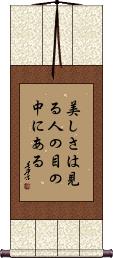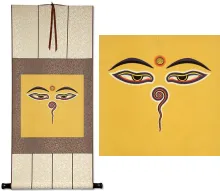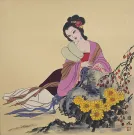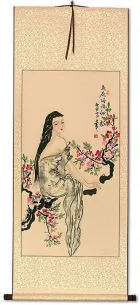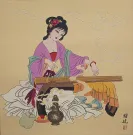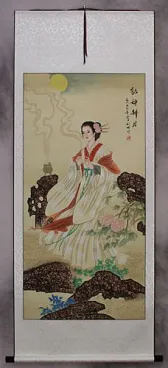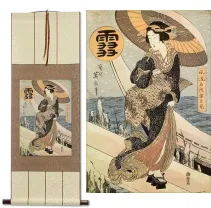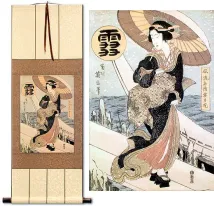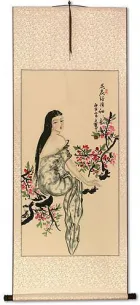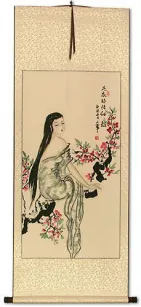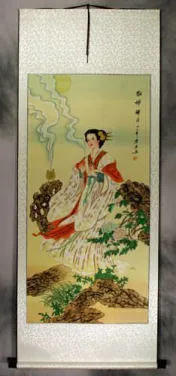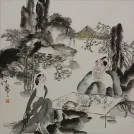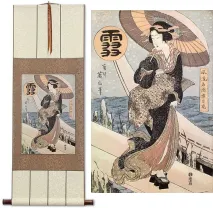Many custom options...
And formats...

Beauty is in the Eyes of the Beholder in Chinese / Japanese...
Buy a Beauty is in the Eyes of the Beholder calligraphy wall scroll here!
Personalize your custom “Beauty is in the Eyes of the Beholder” project by clicking the button next to your favorite “Beauty is in the Eyes of the Beholder” title below...
Beauty is in the eyes of the beholder
美しさは見る人の目の中にある means “Beauty is in the eyes of the beholder” in Japanese.
Japanese grammar and word order are different than English, but I will partially break this down for you:
美しさ = Beauty
は = is/relates
見る = to look/see
人の = person's
目の = eye's
中にあ = inside
る = !
Note: Because this selection contains some special Japanese Hiragana characters, it should be written by a Japanese calligrapher.
You are always a beauty in your lover’s eyes
Any woman with affection for Asian art will love a gift of this Chinese proverb calligraphy on a wall scroll.
She will melt in your arms as you tell her the meaning of these characters.
Contained in this phrase is a reference to the most beautiful woman in Chinese history. Her name was Xi Shi, and she was known to have good looks that need not have fine robes or makeup. Her charms were so powerful that she brought down an entire kingdom (in a successful effort to bring honor and pride back to her people).
情人眼里出西施 is a great way to express that the woman in your life is your one love.
This in-stock artwork might be what you are looking for, and ships right away...
Gallery Price: $100.00
Your Price: $49.88
Gallery Price: $200.00
Your Price: $95.88
Asian Beauty
Beautiful Chinese Woman Painting
Discounted Blemished
Gallery Price: $89.00
Your Price: $49.00
Gallery Price: $200.00
Your Price: $88.88
Asian Beauty
Classic Beautiful Chinese Woman Painting
Discounted Blemished
Gallery Price: $89.00
Your Price: $49.00
Gallery Price: $108.00
Your Price: $59.88
Gallery Price: $108.00
Your Price: $59.88
Gallery Price: $200.00
Your Price: $88.88
Gallery Price: $200.00
Your Price: $88.88
Gallery Price: $126.00
Your Price: $69.88
Gallery Price: $232.00
Your Price: $128.88
Gallery Price: $178.00
Your Price: $98.88
Gallery Price: $108.00
Your Price: $59.88
Not the results for beauty is in the eyes of the beholder that you were looking for?
Below are some entries from our dictionary that may match your beauty is in the eyes of the beholder search...
| Characters If shown, 2nd row is Simp. Chinese |
Pronunciation Romanization |
Simple Dictionary Definition |
情人眼裡出西施 情人眼里出西施 see styles |
qíng rén yǎn lǐ chū xī shī qing2 ren2 yan3 li3 chu1 xi1 shi1 ch`ing jen yen li ch`u hsi shih ching jen yen li chu hsi shih |
lit. in the eyes of a lover appears 西施[Xi1 shi1] (idiom); fig. beauty is in the eye of the beholder |
情人眼裡有西施 情人眼里有西施 see styles |
qíng rén yǎn lǐ yǒu xī shī qing2 ren2 yan3 li3 you3 xi1 shi1 ch`ing jen yen li yu hsi shih ching jen yen li yu hsi shih |
In the eyes of the lover, a famous beauty (idiom). Beauty in the eye of the beholder |
The following table may be helpful for those studying Chinese or Japanese...
| Title | Characters | Romaji (Romanized Japanese) | Various forms of Romanized Chinese | |
| Beauty is in the eyes of the beholder | 美しさは見る人の目の中にある | utsukushi-sa wa miru hito no me no naka ni aru | ||
| You are always a beauty in your lover’s eyes | 情人眼里出西施 | qíng rén yǎn lǐ chū xī shī qing2 ren2 yan3 li3 chu1 xi1 shi1 qing ren yan li chu xi shi qingrenyanlichuxishi | ch`ing jen yen li ch`u hsi shih chingjenyenlichuhsishih ching jen yen li chu hsi shih |
|
Successful Chinese Character and Japanese Kanji calligraphy searches within the last few hours...
